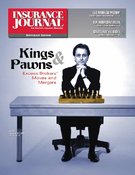Back to Earth and Up to Albany for N.Y.’s Excess & Surplus Marketplace
After setting records in 2004, the excess and surplus market in New York is expected to calm down this year, as the tremors from the Sept. 11 tragedy and the Enron and Worldcom scandals lessen.
“I do think ’04 was the peak year. We’re hearing more than anecdotally that renewals are easing up, terms and conditions are easing up, and pricing is easing up,” all of which should result in a slowdown in transaction and premium volume for the nonadmitted market, according to Daniel Maher.
As executive director of the Excess Lines Association of New York, the state’s clearinghouse and stamping office for nonadmitted coverages, Maher has a front row seat on how the market is behaving. From his seat, Maher saw the excess market scale new heights in 2004, processing more than 190,000 deals worth more than $3 billion in gross premium. That was about three times the number of transactions and seven times more premium than ELANY averaged in its previous 10 years of business.
The uptick in volume at ELANY actually began a few months prior to the Sept. 11, 2001, attack when the standard market was just beginning to harden. Volume surged after the World Trade Center fell and then picked up further after corporate scandals on Wall Street.
“Property became very hard, particularly here in New York,” Maher said. “Then director and officers and other professionals tended to follow after the Wall Street scandals involving Enron and Worldcom. So we actually saw the business start to harden almost across every line.”
ELANY’s premiums jumped 30 percent in 2004 over the year before. The top five categories of business for ELANY in 2004 were general liability, E&O, umbrella, all risk and multi-peril.
Pockets to fill
While Maher is forecasting fewer submissions this year, he knows that the phones won’t stop ringing altogether because there is always demand for nonadmitted coverages. “We have all kinds of pockets,” he said, citing contractors and owners of skyscrapers among the more prominent.
New York’s infamous (in insurance circles anyway) “scaffolding law” is one of the main reasons contractors will continue to show up on ELANY’s books, according to Maher. This section of the labor law imposes almost absolute liability upon contractors for workers’ injuries in certain circumstances involving falls. It is widely blamed for reducing the availability of liability coverage for contractors from admitted carriers. Several attempts to amend the liability statute have come up short in Albany.
“The absolute liability pushes this contractors’ pocket into the nonadmitted market and since the law hasn’t changed, it’s going to stay here,” he said.
Contracting on export list
ELANY has been trying for years to get contractors added to the state’s export list, the official list of coverages that can be placed in the nonadmitted market without going through the usual procedures that include documentation of declinations from standard carriers. State officials have thus far been reluctant to expand the list. Maher hopes to continue this effort with incoming Superintendent of Insurance Howard Mills.
Also nonadmitted carriers transacting business through ELANY will continue to be called upon to supply some of the higher limits on certain major capacity risks such as giant Manhattan properties and skyscrapers as they have done for years. For example, the World Trade Center had $3.2 billion of policy limits, which required several excess insurers to complete the package, he noted.
ELANY will also see some personal lines business, a constant but not large pool compared to the nonadmitted personal lines books in other states. The relatively small personal lines book for ELANY is testimony Maher thinks to the standard personal lines markets in the state being rather healthy and to the trend of personal lines carriers using more “cookie cutter” underwriting. More personal lines business stays in the admitted market because insurers have developed automatic underwriting profiles to handle it. “There are efficiencies there,” he said of the personal lines approach, “so 90 percent or more gets placed in the admitted market.”
What’s left in personal lines for nonadmitted carriers tends to be properties near the coast, homes with very high values, and risks with multiple claims that standard carriers have decided may be too risky.
TRIA-less scenario
The scenario of a relatively calmer 2005 at ELANY could change at any point, given that the world is full of dangers, natural and man-made. One issue Maher will be closely monitoring is the fate of the federal Terrorism Risk Insurance Act, or TRIA, which provides a federal backstop for insurers–including excess insurers–so that they can more readily provide terrorism coverage. There have been signals from Republican leaders in Washington that they are not certain they want to renew this program, a program that the insurance industry sees as vital.
Prior to TRIA, there were only a handful of insurers offering standalone terrorism coverage, Maher recalls. Some large property owners bought it, in part due to pressure from banks.
The failure to renew TRIA would definitely be felt in New York. “While the property market is soft nationwide, there is still a tightness here in New York,” Maher observed.
“If there is no TRIA, the market will revert to that standalone coverage and pricing will be substantially higher. I think it would tighten up very quickly.”
The investigation by New York Attorney General Eliot Spitzer into contingent fees and bid rigging at Marsh may not have a direct impact on ELANY itself but, Maher suggests, it affects all brokers including those with whom ELANY deals.
Broker disclosure
As Maher explains, business placed in the nonadmitted market in New York originates from two main sources: large alphabet brokerage houses that are also retailers and from brokers that sell wholesale only and do not deal with clients directly. Brokers with retail operations will be most affected by any changes in compensation formulas, he believes. Wholesalers have been encouraged that the current model disclosure act developed by the National Association of Insurance Commissioners recognizes that they do not have contact with clients.
“So the industry’s regulators are focused on retailers but wholesalers are watching it closely,” Maher added, maintaining that they condemn the illegal activities but remain concerned about being painted with the same brush as the few caught in the illegal activity.
“There are lots of small brokers who eke out a living and if there weren’t contingent fees there might not be a living to make,” he added.
New York excess lines brokers have their own disclosure requirements. ELANY’s total cost form sets forth any charges that an insured is being asked to pay over and above any commission that is deducted from the premium.
“Some brokers have asked, ‘Why not just enforce the laws we have?'” Maher noted.
Minimum premium victory
While ELANY’s office is in Manhattan, decisions made in Albany affect its future and that of its members.
The past year ELANY has had to lobby hard against a state law that sought to change the minimum premium allowed on some nonadmitted accounts. New York has a law establishing that the most an insurer can claim as earned premium on a premium-financed policy cancelled early is the greatest of 10 percent, or $60. But surplus lines insurers usually seek a minimum premium of 25 percent, with the premium finance company agreeing to finance the remaining 75 percent of the premium.
Last year the New York State Insurance Department ruled that the 10 percent limit also applied to surplus lines transactions in which premiums were financed. ELANY officials argued that the restriction was never meant to apply to surplus lines. After extensive lobbying, ELANY finally convinced Gov. George Pataki to sign into law a bill formally exempting excess and surplus lines policies from the 10 percent minimum premium rule.
While it will be watching any compensation disclosure or labor law legislation in Albany closely, ELANY will also face at least one other legislative priority this session. Its own charter expires under a sunset law that requires lawmakers to vote on its renewal.
“We’re optimistic,” said Maher.
Topics Carriers Agencies Excess Surplus New York Contractors
Was this article valuable?
Here are more articles you may enjoy.


 Trapped Tesla Driver’s 911 Call: ‘It’s on Fire. Help Please’
Trapped Tesla Driver’s 911 Call: ‘It’s on Fire. Help Please’  AIG, Chubb Can’t Use ‘Bump-Up’ Provision in D&O Policy to Avoid Coverage
AIG, Chubb Can’t Use ‘Bump-Up’ Provision in D&O Policy to Avoid Coverage  What Analysts Are Saying About the 2026 P/C Insurance Market
What Analysts Are Saying About the 2026 P/C Insurance Market  Longtime Alabama Dentist Charged With Insurance Fraud in 2025 Office Explosion
Longtime Alabama Dentist Charged With Insurance Fraud in 2025 Office Explosion 


